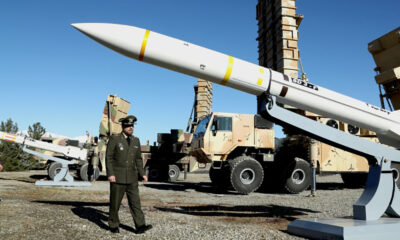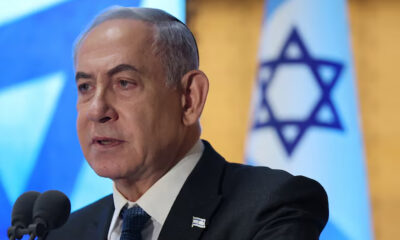Regional
Gulf states must not allow use of airspace against Iran, Iranian official says
The Iranian official said Tehran did not discuss the issue of Gulf Arab oil producers raising output if Iranian production were disrupted during any escalation.
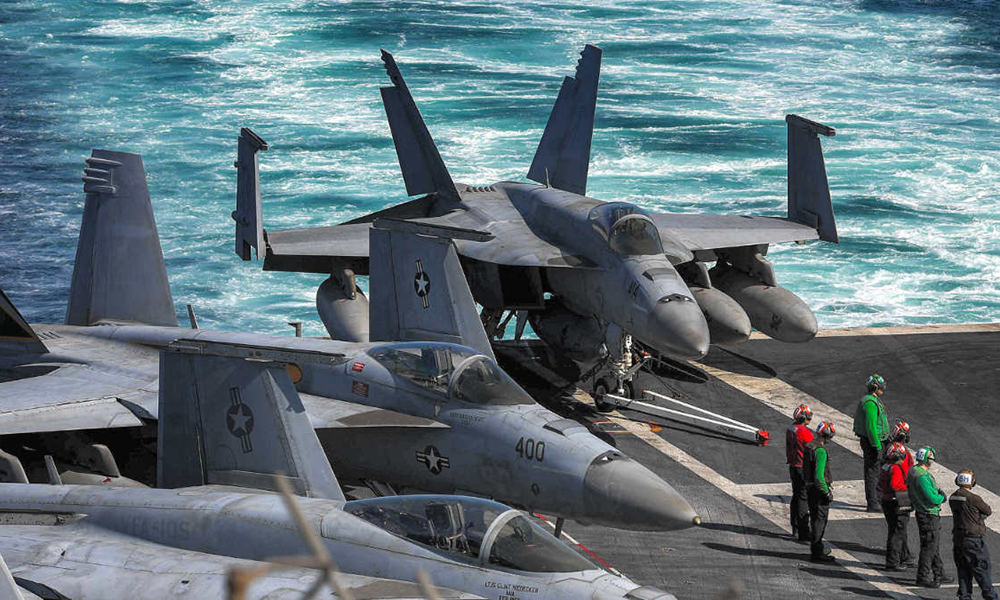
Tehran has told Gulf Arab states it would be "unacceptable" if they allowed use of their airspace or military bases against Iran and warned that any such move would draw a response, a senior Iranian official said.
The official also said any action by Gulf states to balance oil markets should Iranian energy facilities be hit by Israel was not part of the discussions so far, Reuters reported.
The comments come amid growing concern over possible Israeli retaliation for last week's Iranian missile attack, as Iran's Foreign Minister Abbas Araqchi visits Saudi Arabia and other Gulf states including Qatar for talks on Wednesday.
They followed discussions between Iran and Gulf Arab capitals last week on the sidelines of an Asia conference in Qatar, when Gulf states sought to reassure Iran of their neutrality in any conflict between Tehran and Israel.
"Iran made it clear that any action by a Persian Gulf country against Tehran, whether through the use of airspace or military bases, will be regarded by Tehran as an action taken by the entire group, and Tehran will respond accordingly," the senior Iranian official told Reuters.
"The message emphasised the need for regional unity against Israel and the importance of securing stability," he said.
"It also made clear that any assistance to Israel, such as allowing the use of a regional country’s airspace for actions against Iran, is unacceptable."
U.S. President Joe Biden is expected to hold a telephone call on Wednesday with Israeli Prime Minister Benjamin Netanyahu that will include discussion of any plans to strike Iran, according to a person familiar with the matter, read the report.
Washington hopes to weigh in on whether the response is appropriate, a separate person briefed on the discussions said. The White House did not respond to a request for comment.
Biden said last Friday he would think about alternatives to striking Iranian oil fields if he were in Israel's shoes. Last week he also said he would not support Israel striking Iranian nuclear sites.
The Iranian official said Tehran did not discuss the issue of Gulf Arab oil producers raising output if Iranian production were disrupted during any escalation.
U.S. news website Axios, citing Israeli officials, reported last week that Israel could target oil production facilities within Iran as retaliation.
The Organization of Petroleum Exporting Countries, OPEC, which is de-facto led by Saudi Arabia, has enough spare oil capacity to make up any loss of Iranian supply if an Israeli retaliation knocks out some of the country's facilities, Reuters reported.
Much of OPEC's spare capacity is in the Middle East Gulf region. Iran has not threatened to attack Gulf oil facilities but has previously warned that if "Israel supporters" intervene directly their interests in the region would be targeted.
Top oil exporter Saudi Arabia has had a political rapprochement with Tehran in recent years, which has helped ease regional tensions, but relations remain difficult.
Saudi Arabia has been wary of an Iranian strike on its oil facilities since a 2019 attack on its key refinery at Abqaiq briefly shut down more than 5% of global oil supply. Iran denied involvement.
A Western diplomat in the Gulf said that during Thursday's Gulf-Iran meeting in Doha, Iran made clear that Tehran had called for regional unity in the face of an Israeli attack and that it considered neutrality of Gulf states a bare minimum.
The diplomat said Iran had made clear that Tehran would keep a close eye on how each Gulf country responded in the case of an Israeli attack, and also how U.S. bases housed in their countries were used.
Bahrain, Kuwait, Qatar, Saudi Arabia and the United Arab Emirates all host U.S. military facilities or troops.
Regional
Pakistan’s ex-PM Imran Khan gets bail in state gifts case, his party says

A court in Pakistan granted bail to jailed former prime minister Imran Khan in a case relating to the illegal sale of state gifts, his party said on Wednesday.
Khan, 71, has been in prison since August 2023, but it was not immediately clear if the embattled politician would be released given that he faces a number of other charges too, including inciting violence against the state, Reuters reported.
"If the official order is received today, his family and supporters will approach the authorities for his release," one of his party's lawyers, Salman Safdar, told journalists. Safdar added that, as far as he knew, Khan had been granted bail or acquitted in all the cases he faced.
However, Information Minister Attaullah Tarar, a member of the ruling Pakistan Muslim League-Nawaz party, told Geo TV Khan lacked bail in cases in which he is charged with planning riots by his supporters in the wake of his arrest in May last year.
Khan denies any wrongdoing, and alleges all the cases registered against him since he was removed from power in 2022 are politically motivated to keep him in jail.
The case in which he was granted bail on Wednesday by the Islamabad High Court is known as the Toshakhana, or state treasury case.
It has multiple versions and charges all revolving around allegations that Khan and his wife illegally procured and then sold gifts worth over 140 million rupees ($501,000) in state possession, which he received during his 2018-22 premiership.
Khan and his wife, Bushra Bibi, were both handed a 14-year sentence on those charges, following a three-year sentence handed to him in late 2023 in another version of the same case.
Their sentences have been suspended in appeals at the high court.
The gifts included diamond jewellery and seven watches, six of them Rolexes - the most expensive being valued at 85 million rupees ($305,000).
Khan's wife was released last month after being in the same prison as Khan for months.
Regional
Iran keeping ‘door open’ to talks with Trump
Iran’s deputy foreign minister said that coercion and intimidation would prove ineffective in the long-running stand-off between Iran and the West over Tehran’s nuclear programme
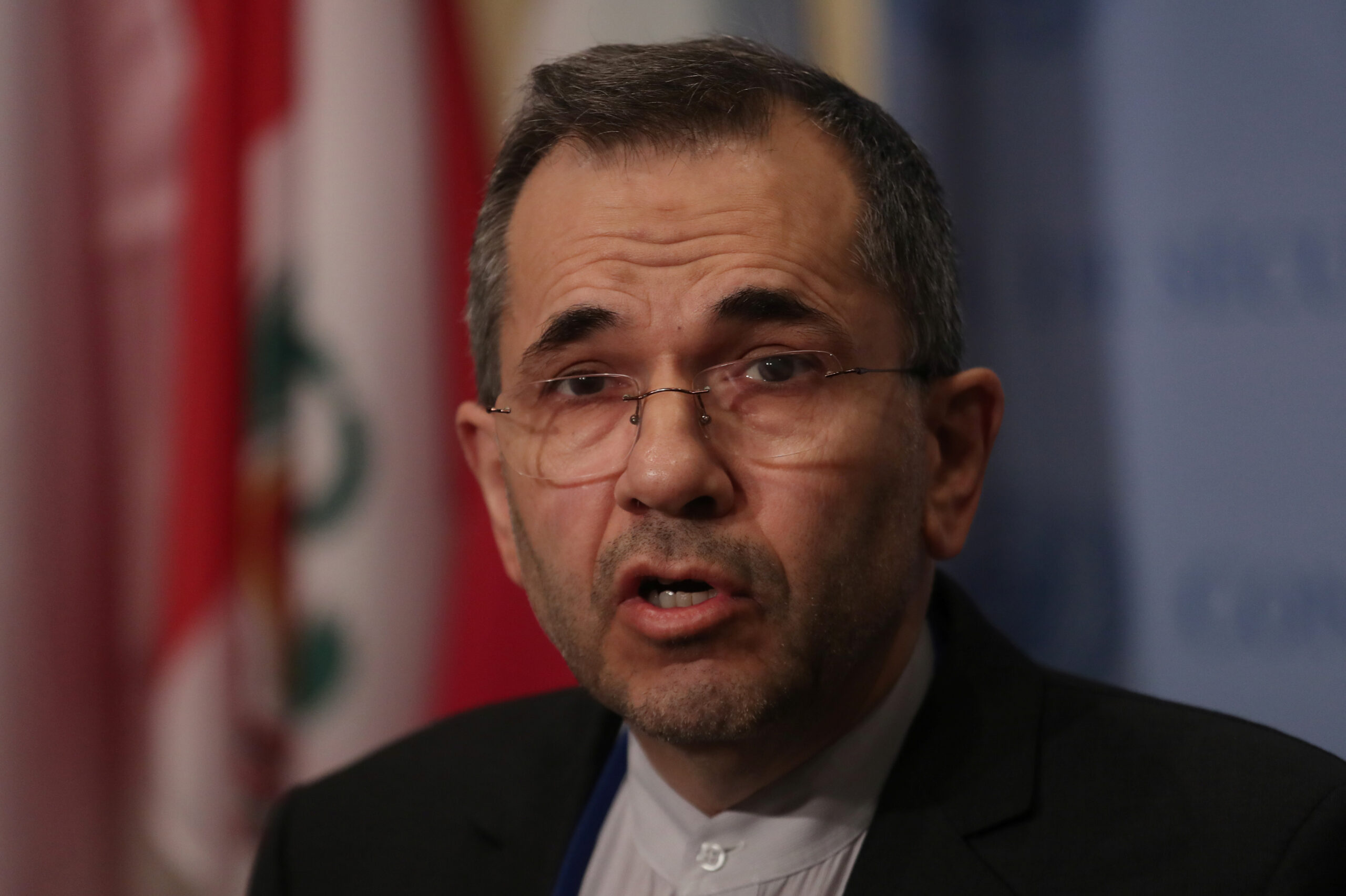
Majid Takht-Ravanchi, Iran’s deputy foreign minister for political affairs says Tehran has kept the door open to negotiations with President-elect Donald Trump’s administration, while warning the US that any attempt to reimpose “maximum pressure” on the country would fail to extract concessions.
Speaking to the Financial Times, Takht-Ravanchi said that coercion and intimidation would prove ineffective in the long-running stand-off between Iran and the West over Tehran’s nuclear program.
“As for negotiations, we need to observe US policy and decide how to respond accordingly,” Takht-Ravanchi said.
“Right now, the key question is how the new administration will approach Iran, the nuclear issue, regional security and the Middle East. It’s premature to speculate about specific outcomes.”
Takht-Ravanchi said the nuclear deal reached with the West in 2015, from which Trump later withdrew the US, “could still serve as a foundation and be updated to reflect new realities”, adding that “if the other parties return to their commitments, we have repeatedly said that we are willing to do the same”.
He added: “We do favour negotiations, as we proved [with that deal] . . . But who sabotaged the negotiations previously? It was the Trump administration who was unwilling to negotiate.”
At the same time, the veteran diplomat and former nuclear negotiator warned that if Trump again takes a tough approach, “maximum pressure will be met with maximum resistance”.
“We will continue to work around sanctions, diversify our trade partners and strengthen regional relations to maintain calm,” he added.
During his first term as US president, Donald Trump sparked a nuclear stand-off with Iran after he abandoned the 2015 accord, known as the JCPOA, that Tehran had signed with world powers, and imposed waves of sanctions on the Islamic republic in what he called a “maximum pressure” campaign.
He accused Tehran of violating the “spirit” of the agreement by funneling newfound revenue to support its regional proxies, notably Lebanon’s Hezbollah.
In retaliation, Iran dramatically expanded its nuclear activities, and is enriching uranium near to weapons-grade despite insisting its programme is for civilian purposes, Financial Times reported.
People familiar with Trump’s thinking have told the Financial Times his administration would try to “bankrupt” Iran to force the republic into talks.
The regional and nuclear crises have stoked fears in Tehran that Trump will once again try to drive Iran’s oil exports — its vital source of hard currency — to zero. In recent years Iran has substantially increased oil sales, mainly to China.
Takht-Ravanchi sought to downplay the potential for tighter oil sanctions under a second Trump presidency.
“While developments may occur, they won’t lead to significant changes,” he said, adding: “If the Trump administration decides to pursue the maximum pressure policy in the oil market again, it will surely fail. In today’s world, no single country can dictate terms to the entire international community.”
For now, he said, “We hope he doesn’t repeat the same mistake because the outcome will be no different.”
Regional
India’s successful test of hypersonic missile puts it among elite group
The test-firing took place from Dr APJ Abdul Kalam island off the eastern coast of Odisha state on Saturday, it said.

India has successfully tested a domestically developed long-range hypersonic missile, it said on Sunday, attaining a key milestone in military development that puts it in a small group of nations possessing the advanced technology, Reuters reported.
The global push for hypersonic weapons figures in the efforts of some countries, such as India, which is striving to develop advanced long-range missiles, along with China, Russia and the United States.
The Indian missile, developed by the state-run Defence Research and Development Organisation and industry partners, is designed to carry payloads for ranges exceeding 1,500 km (930 miles) for the armed forces, the government said in a statement.
"The flight data ... confirmed the successful terminal manoeuvres and impact with high degree of accuracy," it added.
The test-firing took place from Dr APJ Abdul Kalam island off the eastern coast of Odisha state on Saturday, it said.
Defence Minister Rajnath Singh called the test a "historic achievement" in a post on X, adding that it placed India among a select group of nations possessing such critical and advanced technologies, read the report.
-

 Latest News5 days ago
Latest News5 days agoOttawa taking detention of Canadian in Afghanistan ‘very seriously’
-

 Sport5 days ago
Sport5 days agoFIFA unveils Innovative Club World Cup Trophy ahead of new tournament in 2025
-
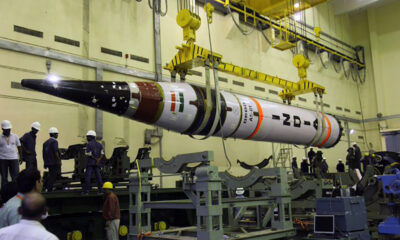
 Regional5 days ago
Regional5 days agoIndia’s successful test of hypersonic missile puts it among elite group
-
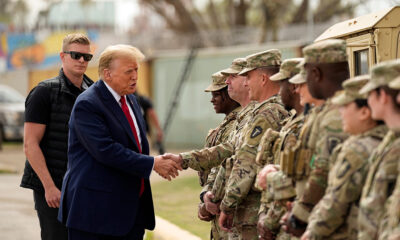
 Latest News5 days ago
Latest News5 days agoTrump team compiling list of military officers responsible for US withdrawal from Afghanistan
-

 Latest News5 days ago
Latest News5 days agoCanada sent 19 failed asylum seekers back to Afghanistan last year
-

 Sport4 days ago
Sport4 days agoAbu Dhabi’s thrilling T10 tournament just days away
-

 World4 days ago
World4 days agoBiden allows Ukraine to use US arms to strike inside Russia
-

 Sport3 days ago
Sport3 days agoAfghanistan beat UAE by 169 runs in U19 tri-series


